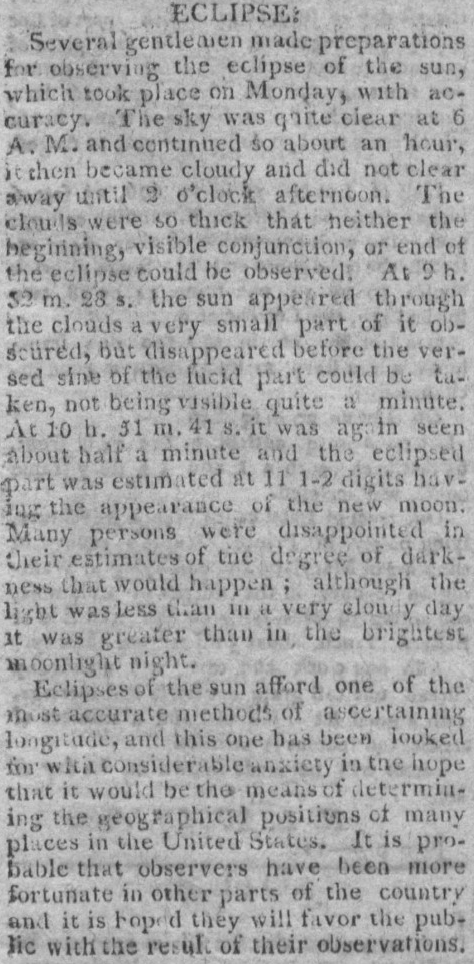Washington National Intelligencer - June 18, 1806
The total eclipse of June 16, 1806, entered North America from the Spanish-controlled Southwest, moved across the continent in a northeasterly direction, and crossed over parts of Pennsylvania, New York, Massachusetts, and several other New England states. Although the path of totality missed Washington, DC, the National Intelligencer published this account of the partial eclipse as seen from the young nation's capital, reporting that clouds spoiled most of the event for observers. The article goes on to say that many people were disappointed with the degree of darkness experienced during even a 90 percent partial eclipse (a common complaint heard even today—some things never change!) and that the eclipse had been highly anticipated as a means to accurately determine the longitudes of various places in the U.S.
(Any information about eclipse viewing procedures provided in historical articles should be considered unsafe)
Original Image |
Transcription |
Map
ECLIPSE.
Several gentlemen made preparations for observing the eclipse of the sun, which took place on Monday, with accuracy. The sky was quite clear at 6 A.M. and continued so about an hour, it then became cloudy and did not clear away until 2 o'clock afternoon. The clouds were so thick that neither the beginning, visible conjunction, or end of the eclipse could be observed. At 9 h. 52 m. 28 s. the sun appeared through the clouds a very small part of it obscured, but disappeared before the versed sine of the lucid part could be taken, not being visible quite a minute. At 10 h. 51 m. 41 s. it was again seen about half a minute and the eclipsed part was estimated at 11 1-2 digits having the appearance of the new moon. Many persons were disappointed in their estimates of the degree of darkness that would happen; although the light was less than in a very cloudy day it was greater than in the brightest moonlight night.
Eclipses of the sun afford one of the most accurate methods of ascertaining longitude, and this one has been looked for with considerable anxiety in the hope that it would be the means of determining the geographical positions of many places in the United States. It is probable that observers have been more fortunate in other parts of the country and it is hoped they will favor the public with the result of their observations.
(Any information about eclipse viewing procedures provided in historical articles should be considered unsafe)
NEWSPAPER INDEX
